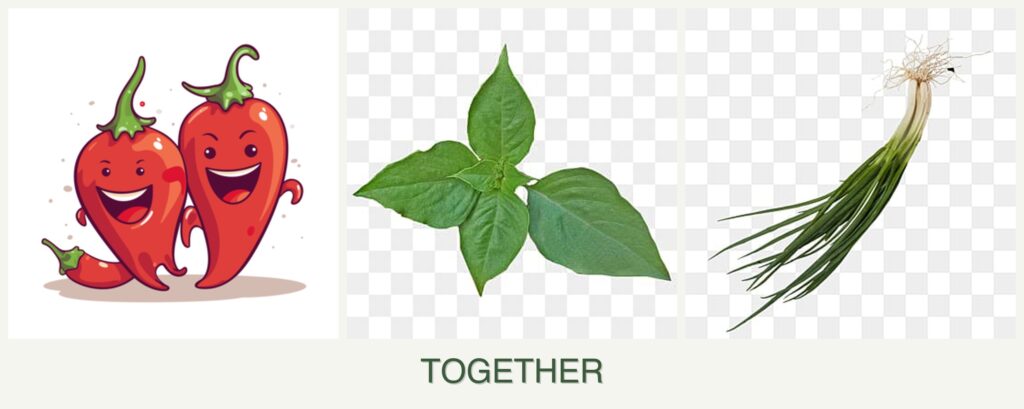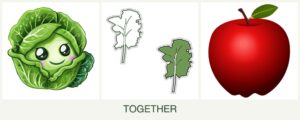
Can you plant peppers, basil and chives together?
Can You Plant Peppers, Basil, and Chives Together?
Companion planting is a popular gardening technique that involves growing different plants together to enhance growth, improve flavor, and ward off pests. Gardeners often wonder if peppers, basil, and chives can be planted together. This article explores their compatibility and offers tips for successful planting.
Compatibility Analysis
Yes, you can plant peppers, basil, and chives together. These three plants complement each other well in a garden setting. They share similar growth requirements and can mutually benefit from each other’s presence.
- Growth Requirements: Peppers, basil, and chives all thrive in full sun and well-drained soil. They require moderate watering and prefer slightly acidic to neutral soil pH.
- Pest Control: Basil and chives are known for their pest-repellent properties. Basil can deter aphids and thrips, while chives can help keep away carrot flies and Japanese beetles, benefiting pepper plants.
- Nutrient Needs: All three plants have moderate nutrient needs, making them compatible in terms of soil fertility requirements.
- Spacing: Proper spacing is crucial to ensure each plant receives adequate sunlight and air circulation, which helps prevent disease.
Growing Requirements Comparison Table
| Plant | Sunlight Needs | Water Requirements | Soil pH | Soil Type | Hardiness Zones | Spacing | Growth Habit |
|---|---|---|---|---|---|---|---|
| Peppers | Full Sun | Moderate | 6.0-6.8 | Well-drained | 9-11 | 18-24 in | 1-3 ft tall, 1-2 ft spread |
| Basil | Full Sun | Moderate | 6.0-7.5 | Well-drained | 10-11 | 12-18 in | 1-2 ft tall, 1 ft spread |
| Chives | Full Sun | Moderate | 6.0-7.0 | Well-drained | 3-9 | 8-12 in | 12-18 in tall, 12 in spread |
Benefits of Planting Together
Planting peppers, basil, and chives together offers numerous benefits:
- Pest Repellent Properties: Basil and chives can deter insects that might otherwise harm pepper plants.
- Improved Flavor and Growth: Basil is believed to enhance the flavor of peppers when grown nearby.
- Space Efficiency: These plants can be interplanted to maximize garden space.
- Soil Health Benefits: Chives can improve soil health by attracting beneficial insects and microorganisms.
- Pollinator Attraction: Basil flowers attract pollinators, which can benefit the entire garden.
Potential Challenges
Despite their compatibility, there are potential challenges:
- Competition for Resources: Ensure adequate spacing to prevent competition for sunlight and nutrients.
- Different Watering Needs: While they share similar water needs, monitor soil moisture to avoid over or under-watering.
- Disease Susceptibility: Good air circulation can prevent diseases like powdery mildew.
- Harvesting Considerations: Be mindful of plant size and growth habits to facilitate easy harvesting.
Practical Solutions
- Use mulch to retain soil moisture and regulate temperature.
- Rotate crops annually to prevent soil-borne diseases.
- Implement drip irrigation for consistent watering.
Planting Tips & Best Practices
- Optimal Spacing: Maintain recommended spacing to ensure healthy growth.
- Timing: Plant after the last frost when the soil has warmed.
- Container vs. Garden Bed: All three can be grown in containers, but ensure pots have drainage holes.
- Soil Preparation: Enrich soil with compost before planting.
- Companion Plants: Consider adding marigolds or nasturtiums, which also pair well with these plants.
FAQ Section
-
Can you plant peppers and basil in the same pot?
- Yes, but ensure the pot is large enough to accommodate both plants’ root systems.
-
How far apart should peppers and chives be planted?
- Space peppers 18-24 inches apart and chives 8-12 inches apart for optimal growth.
-
Do peppers and basil need the same amount of water?
- Yes, both require moderate watering, but monitor soil moisture to avoid over-watering.
-
What should not be planted with peppers, basil, and chives?
- Avoid planting fennel and kohlrabi, as they can inhibit growth.
-
Will basil affect the taste of peppers?
- Basil is believed to enhance the flavor of peppers when grown nearby.
-
When is the best time to plant these together?
- After the last frost, when the soil is consistently warm.
By understanding the compatibility and requirements of peppers, basil, and chives, gardeners can successfully integrate these plants into their vegetable or herb gardens, reaping the benefits of companion planting.



Leave a Reply